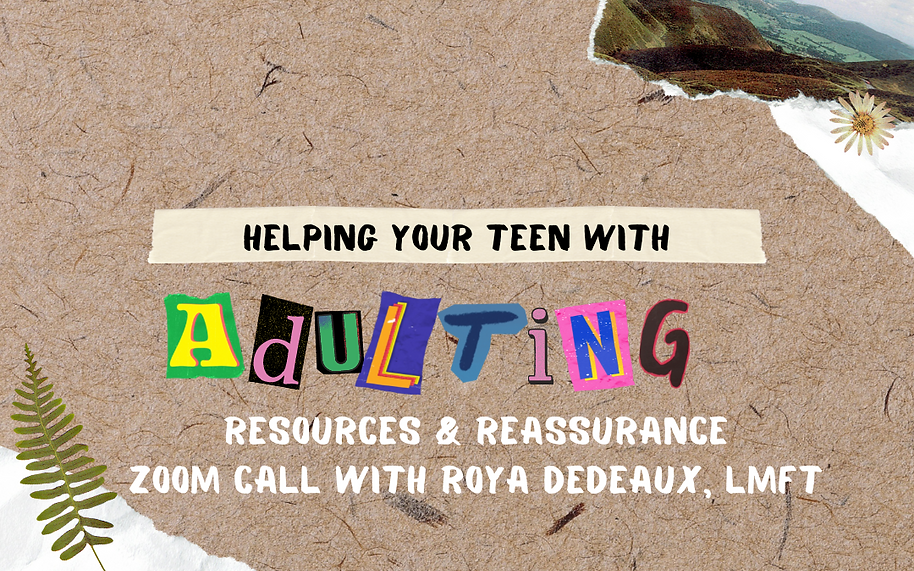Is negative self talk normal for teens?

Ahhh teenagers.
Scaring their parents since the dawn of time.
So much crap exists in the mainstream media world about how awful the adolescent years can be, which is probably why I adore working with this group of folks so dang much.
Sullen? Isolating? Combative?
Try - vibrant, working HARD, processing... and doing it while navigating some of the most important big picture philosophical questions of their lives! Who are they? Why are they that way? Who do they want to be? Do they have what it takes to get there or be that?
It makes sense that through this period there are doubts, worries, and fears. Fear often presents as irritability or anger, which is part of the cliche story of teenager-hood. Fear also can turn around and become internalized, leading to some pretty intense thoughts and feelings of failure and hopelessness.
This is when I get the calls from parents.
"My kid keeps saying they're behind and will never catch up."
"My daughter sees her older sister living on her own and has basically decided she will never feel comfortable leaving home."
"My son's first response to a challenge is to blame himself, call himself a name (like dumb or stupid) and give up! What do I do? Is negative self-talk in teens normal?"
Is negative self-talk in teens normal?
This is, obviously, a complicated question with no single right answer. Yes, to some extent, negative self talk is "normal." (But, btw, "normal" and "healthy" are NOT synonyms.) We all have moments where we aren't thrilled with how we are acting, or wish we were doing better.
However, ongoing self-bashing or internalized shame does worry me as a therapist. Sometimes we get locked in a certain story of ourselves, and it does take help and intervention to rewrite it. That's what I do as a narrative therapist. I help teens - but I also help you, their parents, because it's really difficult when you're that close to the situation.
First - remember what stage of development they are in.
Anyone who has taken a basic psych or child development class has heard the name Erik Erikson. He wrote about the psycho-social stages of human development and the crisis we go through in each of them. Teenagers are going through Identity versus Role Confusion. Essentially - they are trying to figure out who they are and where they belong.
GROWTH IS UNCOMFORTABLE, because growth doesn't happen in our safety-zones, and teenagers are spending a lot of time in the growth zone. They are stretching their limits, pushing boundaries (theirs and yours) and it is their developmental job to do just that.

It's their job, and their job is uncomfortable. So remember that the next time you think they're being moody for no reason.
Because it's uncomfortable, they can often think they're doing it wrong or that they aren't good enough.
There is so much variation in teen development that it's easy to look around at others and compare themselves, and find themselves lacking. Also, because finding their place in the world (and with their friends) is such a focus of their developmental job as teens they can be really focused on their social group, which means there is a lot of comparison happening.
The cherry on top is that they are also dealing with societal expectations that they might feel like they don't have the skills to handle yet... like the thought that they're supposed to move out and suddenly know everything about adulting at the age of 18. When you're 15, that can feel incredibly daunting. Even if they are in a family that doesn't expect that, there are many covert messages that suggest they're supposed to be *able* to do that.
So - discomfort, growth, these things will happen.
What we want to avoid is ongoing internalization that there is something wrong with them for having challenges or struggles.
Here are 4 Solutions for Parents
1. DON'T REASSURE
This goes against the grain, I know. But when you say, "no, no, it's fine, you're fine, it'll be easy, you're great" you dismiss their fears which makes them a) not be able to trust you, and b)feel even more shame that they have the fears.
We aren't always great at sitting next to someone in discomfort, but that's what you have to do.
2. EXTERNALIZE (said in Daalek voice)
Use "person-first" language even if it feels silly. "I'm a failure" turns into, "you're someone who is having a hard time right now." Bonus - putting that "right now" on the end of the sentence gives language to the fact that this is a temporary feeling without you having to explicitly say, "this is a temporary feeling."
3. ADD TO THE EVIDENCE
Help with restating. They say, "I can't do this, I'm a failure" you nod, and say, "yes, this situation is really throwing up some big challenges!"
Help generalize skills. Do they show strength or aptitude in Minecraft, on the soccer field, with their younger siblings? Help connect the dots for them so they can see that those qualities could transfer. "I'm never going to be able to do this" can be met with, "This reminds me of when you struggled for weeks to beat that boss on Mario Odyssey! I was so impressed by your persistence."
4. GATHER YOUR OWN TOOLS
Check out this parenting webinar on how to help your kids with adulting. It will help you work through your own fears and anxieties without passing them along to your teen!
Roya Dedeaux is a Licensed Marriage and Family Therapist with a focus on using creative tools like art, writing, and recreation as a way to help teens and their families who don't quite fit the mold.
Roya’s first book, Connect with Courage: practical ways to release fear and find joy in the places your kids take you is the result of her background in Recreation and Leisure Studies and Marriage and Family Therapy and is the base of her Connect with Courage Parenting Course.
She loves running her private practice, creating art prompts for her
two online art groups, and running games and challenges in the
free Recreate Parenting Facebook community! When she's not doing that, she loves to make messes with her three wild & wonderful kids where they live and play hard in Southern California.





